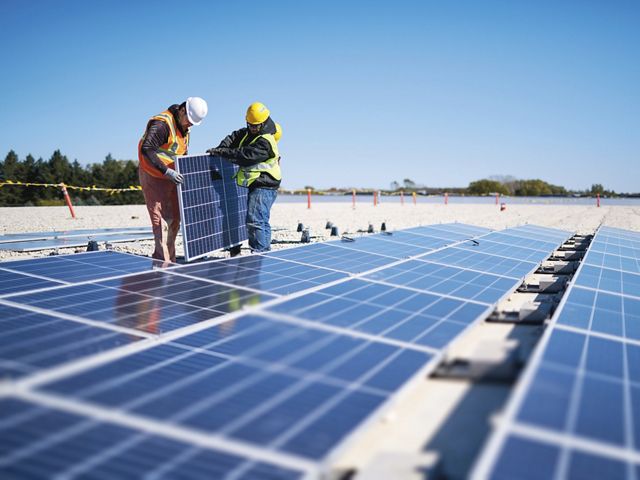Greenhouse Gas Reduction Fund Is a Way to Tackle Climate Change and Help Communities
The EPA’s $20 billion award will fund thousands of clean energy and climate projects across the country
Media Contacts
-
Cody Sullivan
Associate Director of Communications, North American Climate Policy
The Nature Conservancy
Email: cody.sullivan@tnc.org
Today, the U.S. Environmental Protection Agency (EPA) announced awards for the Greenhouse Gas Reduction Fund, a signature piece of the Inflation Reduction Act. Eight organizations and coalitions were selected to receive $20 billion between them to advance clean energy and climate solutions in and for communities around the country. The $20 billion could mobilize up to $150 billion of private investment and help fill a gap in accessible financing for low-income and underserved communities. This financing will help catalyze thousands of projects to reduce air pollution, improve public health, bring down energy costs and create new clean energy jobs. Together, they will reduce or avoid up to 40 million metric tons of climate pollution per year.
Quote: Laura Brannen
The Greenhouse Gas Reduction Fund is an important mechanism to make clean energy investments possible for more families and communities, especially those historically lacking access to financing and overburdened by pollution.

“Big investments that generate gigawatts of clean energy and megatons of emissions reductions tend to make headlines, but every solar panel, energy-efficient water heater or window upgrade, and electric vehicle charger makes a difference for the climate and for the families and small businesses that benefit. The Greenhouse Gas Reduction Fund is an important mechanism to make clean energy investments possible for more families and communities, especially those historically lacking access to financing and overburdened by pollution,” said Laura Brannen, senior policy advisor and federal climate policy team lead at The Nature Conservancy. “This $20 billion investment by the EPA will help catalyze community-centered financing and economic ecosystems that support climate and clean energy solutions in ways that work best for the specific needs of the families, small businesses, farmers, schools, local non-profits, Tribal communities and others. This shows that we can tackle climate change and help communities at the same time.
“By design, 70% of the Greenhouse Gas Reduction Fund capital will be directed toward low-income and disadvantaged communities. This focus will help ensure more communities can access and benefit from the clean energy transition. The breadth and depth of investments that will be unlocked by the Greenhouse Gas Reduction Fund are the scale of solutions needed to tackle the climate crisis and secure healthier, more resilient and prosperous communities.”
The Nature Conservancy is a global conservation organization dedicated to conserving the lands and waters on which all life depends. Guided by science, we create innovative, on-the-ground solutions to our world’s toughest challenges so that nature and people can thrive together. We are tackling climate change, conserving lands, waters and oceans at an unprecedented scale, providing food and water sustainably and helping make cities more sustainable. The Nature Conservancy is working to make a lasting difference around the world in 81 countries and territories (40 by direct conservation impact and 41 through partners) through a collaborative approach that engages local communities, governments, the private sector, and other partners. To learn more, visit nature.org or follow @nature_press on X.



